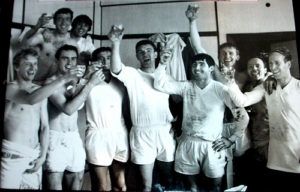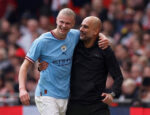Football and booze go a long long way back, in 1893 an Anglican Vicar said,”football is a fascination of the devil and a twin sister of the drink system.”And that devilish twin sister of the sport we all love,is still alive and kicking. Back in the 19th century there was a close connection between most of the football clubs and local pubs. In those days with no televisions,the only way to see a match was to go to the stadium. Else you could visit the local pub where match updates would be sent via telegram. And when the clubs won trophies, the first place they showcased was the local pub. So pubs became a focal point where supporters,players and even managers gathered to discuss the usual football talk. The players also got a reputation of spending all their free time at the local pubs, but reckless drinking and late night binges always had an effect on a player’s career. We had managers who tried to stamp alcoholism out of the game,but they rarely succeeded in those times. Herbert Chapman manager of Arsenal in the 1920s tried his best to sign players who were teetotalers. The legend goes that he always used to ask player if they smoked or drank and if they said no, then he would ask them,”Would you like to sign for Arsenal?”.
The moment you see the two words Manchester United and alcohol in a sentence, you assume it is about George Best. Best’s career and his life were cut short due to his (in)famous lifestyle. He once famously said:
In 1969 I gave up women and alcohol – it was the worst 20 minutes of my life.
Ironically,here Best is the only one not drinking
But Manchester United go further back with their connection with Alcohol. In 1902 Newton Heath was £2,670 in debt and if they couldn’t raise the money,they had to close. At a shareholders’ meeting in the New Islington Hall, the local Manchester brewer, John Henry Davies said that he was willing to takeover the club’s debts along with three other business men. And the plan was approved and John Henry Davies along with his partners renamed the club to Manchester United.
25 years ago,when Sir Alex Ferguson first arrived at Old Trafford,they were languishing at 17th in the league and the club had a big drinking problem. Gordan Strachan had warned Alex Ferguson that alcohol was a big problem at United even before Ferguson had contemplated moving south from Aberdeen. Strachan was an Aberdeen player under Ferguson and later moved to Manchester United and again played under his old boss when the latter became the gaffer at Manchester. During the numerous phone calls which Gordan made to Sir Alex when he first moved to Manchester,he often said that the whole club was talking about him(Sir Alex) being their next manager,and warned him about the drinking problems at the club.
When he first arrived at the club,the chairman Martin Edwards confirmed all of Strachan’s accounts. Ferguson has an interesting theory on why British players boozed a lot,certainly a lot more than their continental counter parts. He said in his autobiography that the English players had this “shift-worker’s” mentality of working hard all day long and then boozing hard into the night.
When Ferguson first arrived at United there was a club rule that forbade players to drink 2 days before a game. He immediately changed the rule to make it an offense for a player to drink while he was in training. He understood that the problem was very serious when in his first match in charge against Oxford, they lost 2-0 primarily due to poor fitness levels. The players on the previous Thursday had been boozing at Ron Atkinson(Who was the manager of Manchester United before Sir Alex Ferguson)’s farewell party.
Bryan Robson,Paul Mcgrath and Norman Whiteside formed a troublesome threesome when it came to drinking. Those three were the most talented among the players United had at that time. Bryan Robson had a fierce determination to do well and the whole team looked upon him as a hero. So a sense of responsibility and his desire to perform to the limit when he was on the pitch limited his alcoholic escapades. But the two Irishmen Mcgrath and Whiteside were a serious problem to Ferguson. Norman Whiteside was a “wonderkid” as Football Manager Fans would call him. Introduced to the Northern Ireland team at 17, he played at the 1986 World Cup. At least Whiteside accepted that he had a problem and he tried to listen to Ferguson when the Scotsman would talk to him about his drinking binges. But Paul Mcgrath was a different case altogether.

Paul Mcgrath whenever confronted by Ferguson, didn’t seem to accept that he had a problem. Even worse was the effect he had on his mate Whiteside, both regularly had late night binges which drastically effected their game on the pitch. Even Sir Matt Busby tried to talk to Mcgrath, but he seemed impenetrable. Eventually Ferguson decided to sell both of them and bring some sort of a control to Mancheser United ‘s social life. Both of them were quite popular with the fans and when they were sold, there was a lot of public anger. But Ferguson went ahead and got what he wanted. As far as Bryan Robson was concerned,his occasional late night travails was a small price to pay for his brilliance on the field.










Recent Comments